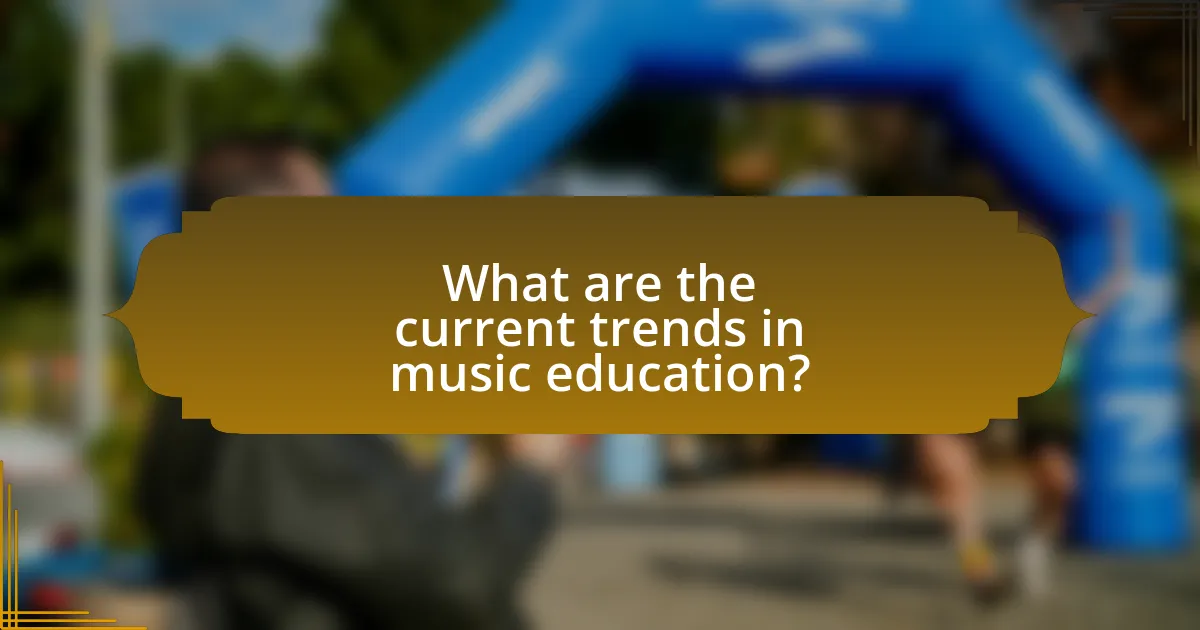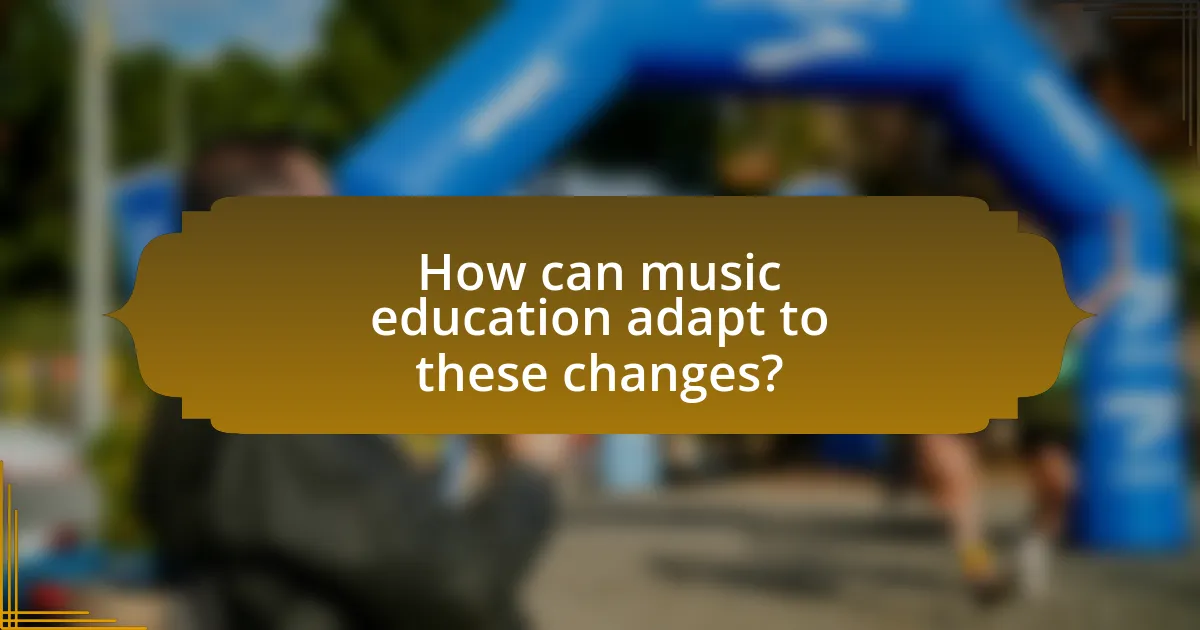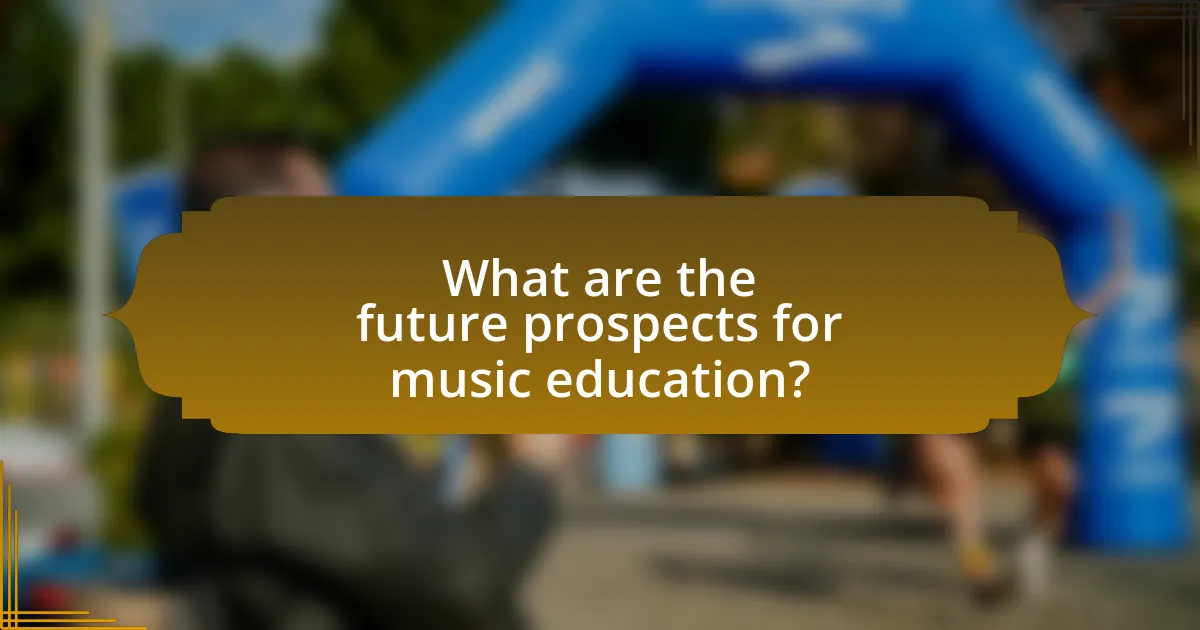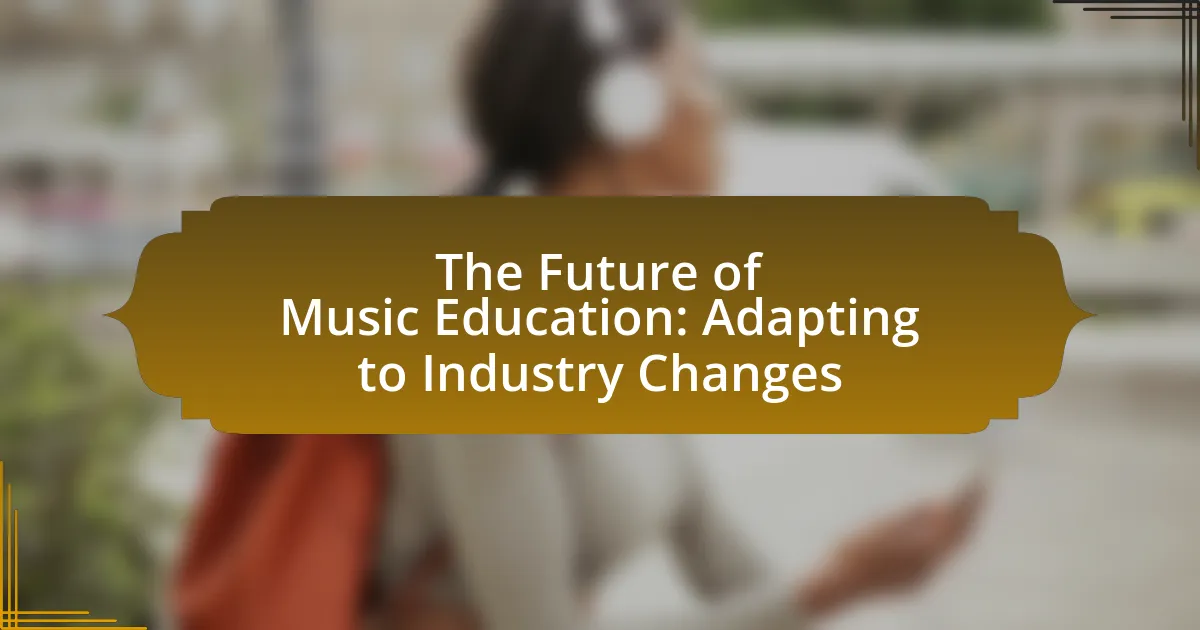The article focuses on the future of music education and its adaptation to industry changes. It highlights current trends such as the integration of technology, diverse musical genres, and social-emotional learning, which enhance student engagement and inclusivity. The influence of technological advancements on accessibility and personalized learning experiences is examined, along with emerging tools and platforms that facilitate modern music education. Additionally, the article discusses the alignment of curricula with industry demands, the challenges faced in adapting to these changes, and the importance of innovative teaching methods and real-world experiences in preparing students for careers in the evolving music landscape.

What are the current trends in music education?
Current trends in music education include the integration of technology, a focus on diverse musical genres, and an emphasis on social-emotional learning. Technology is increasingly utilized through online platforms and digital tools, allowing for remote learning and access to a wider range of resources. Additionally, educators are incorporating various musical styles beyond traditional Western music, promoting inclusivity and cultural awareness. Social-emotional learning is being prioritized to enhance students’ personal development and collaborative skills, reflecting the growing recognition of the importance of emotional intelligence in education. These trends are supported by research indicating that technology enhances engagement, diverse genres foster creativity, and social-emotional learning improves overall student outcomes.
How are technological advancements influencing music education?
Technological advancements are significantly influencing music education by enhancing accessibility, engagement, and personalized learning experiences. Online platforms and digital tools allow students to access a wide range of resources, including tutorials, sheet music, and interactive software, which facilitate self-paced learning. For instance, applications like SmartMusic provide real-time feedback on performance, helping students improve their skills more effectively. Additionally, virtual classrooms enable collaboration among students and teachers regardless of geographical barriers, fostering a global learning community. Research indicates that the integration of technology in music education leads to increased student motivation and improved learning outcomes, as evidenced by a study published in the Journal of Music Teacher Education, which found that 85% of educators reported enhanced student engagement through the use of digital tools.
What tools and platforms are emerging in music education?
Emerging tools and platforms in music education include online learning platforms, interactive apps, and virtual reality environments. Online platforms like Coursera and Udemy offer courses from renowned institutions, enabling access to quality education globally. Interactive apps such as Yousician and SmartMusic provide real-time feedback and personalized learning experiences, enhancing student engagement. Additionally, virtual reality platforms like Oculus for Business are being utilized to create immersive learning environments that simulate real-life music scenarios. These innovations reflect the industry’s shift towards technology-driven education, making music learning more accessible and engaging.
How do these technologies enhance learning experiences?
Technologies enhance learning experiences by providing interactive and personalized educational tools that cater to individual learning styles. For instance, music education technologies such as digital audio workstations (DAWs) and online learning platforms allow students to engage with music creation and theory at their own pace, fostering deeper understanding and creativity. Research indicates that students using interactive technologies in music education demonstrate improved retention of concepts and increased motivation, as evidenced by a study published in the Journal of Music Education Research, which found that 85% of students reported enhanced engagement when using technology-based learning tools.
What role does industry demand play in shaping music education?
Industry demand significantly influences the structure and content of music education by aligning curricula with the skills and knowledge required in the professional landscape. As the music industry evolves, educational institutions adapt their programs to prepare students for emerging roles, such as digital content creation and music technology, reflecting the industry’s shift towards technology-driven practices. For instance, the rise of streaming services has led to an increased emphasis on music production and marketing in educational settings, ensuring that graduates possess relevant competencies. This alignment is supported by data indicating that 70% of music educators report modifying their curricula in response to industry trends, demonstrating a direct correlation between industry needs and educational practices.
Which skills are most sought after by the music industry?
The most sought-after skills in the music industry include proficiency in music production, digital marketing, and data analysis. Music production skills are essential as they enable artists to create high-quality recordings, which is crucial in a competitive market. Digital marketing skills are increasingly important for promoting music and engaging with audiences through social media and streaming platforms. Data analysis skills help industry professionals understand market trends and consumer behavior, allowing for more informed decision-making. According to a 2021 report by the International Federation of the Phonographic Industry, the demand for digital skills in music has risen significantly, highlighting the industry’s shift towards technology-driven practices.
How can music education programs align with industry needs?
Music education programs can align with industry needs by integrating contemporary music technology and industry-standard practices into their curricula. This approach ensures that students acquire relevant skills such as digital audio production, music marketing, and performance techniques that reflect current industry trends. For instance, a study by the National Association of Schools of Music highlights that programs incorporating technology and real-world applications significantly enhance student employability in the music industry. By collaborating with industry professionals to develop course content and offering internships, music education programs can further ensure that their graduates are well-prepared for the evolving demands of the music sector.
What challenges does music education face in adapting to changes?
Music education faces significant challenges in adapting to changes, primarily due to the rapid evolution of technology and shifting industry demands. Traditional teaching methods often struggle to integrate new digital tools and platforms that are becoming essential for music creation and distribution. For instance, the rise of online music production software and streaming services requires educators to update curricula to include digital literacy and contemporary music styles. Additionally, budget constraints in many educational institutions limit access to updated resources and training for teachers, hindering their ability to effectively teach modern music practices. According to a report by the National Association for Music Education, 70% of music educators feel unprepared to teach technology-based music education, highlighting the urgent need for professional development and resource allocation to address these gaps.
How can educators overcome resistance to change?
Educators can overcome resistance to change by actively involving stakeholders in the decision-making process. Engaging teachers, students, and parents fosters a sense of ownership and reduces apprehension towards new initiatives. Research indicates that when educators implement collaborative strategies, such as workshops and feedback sessions, they significantly increase buy-in and acceptance of changes. For instance, a study by Fullan (2016) highlights that schools that prioritize stakeholder engagement experience smoother transitions during curriculum updates, demonstrating that inclusive practices effectively mitigate resistance.
What are the financial implications of adapting music education?
Adapting music education has significant financial implications, primarily involving increased costs for institutions and potential revenue generation through new programs. Institutions may face expenses related to curriculum development, technology integration, and training for educators to meet evolving industry standards. For instance, a study by the National Association for Music Education indicates that schools investing in modern music technology can enhance student engagement and retention, potentially leading to higher enrollment numbers and associated funding. Additionally, adapting music education to include contemporary genres and digital platforms can attract sponsorships and partnerships with music industry stakeholders, further supporting financial sustainability.

How can music education adapt to these changes?
Music education can adapt to industry changes by integrating technology and contemporary music styles into the curriculum. This adaptation is essential as the music industry increasingly relies on digital platforms and diverse genres. For instance, incorporating software for music production and online collaboration tools can enhance students’ learning experiences and prepare them for modern music careers. Additionally, research from the National Association for Music Education indicates that programs that include contemporary music and technology lead to higher student engagement and retention rates. By aligning educational practices with industry trends, music education can remain relevant and effective.
What innovative teaching methods are being adopted?
Innovative teaching methods being adopted in music education include project-based learning, flipped classrooms, and the integration of technology such as online platforms and digital tools. Project-based learning allows students to engage in real-world music projects, fostering creativity and collaboration. Flipped classrooms enable students to learn theoretical concepts at home through video lectures and apply them in practical sessions during class time. The use of technology, including software for composition and online collaboration tools, enhances accessibility and provides diverse learning experiences. These methods are supported by research indicating that active learning strategies improve student engagement and retention in music education.
How does project-based learning impact music education?
Project-based learning significantly enhances music education by fostering active engagement and practical application of skills. This approach allows students to collaborate on real-world projects, such as composing, performing, or producing music, which deepens their understanding of musical concepts and techniques. Research indicates that students involved in project-based learning demonstrate improved critical thinking, creativity, and problem-solving abilities, essential skills in the evolving music industry. For instance, a study by Thomas Markham in “Project Based Learning Handbook” highlights that students retain knowledge longer and develop a greater sense of ownership over their learning when engaged in hands-on projects.
What is the significance of collaborative learning in music education?
Collaborative learning in music education is significant because it enhances students’ musical skills and fosters social interaction. This approach allows students to engage in group activities, such as ensemble playing and peer feedback, which develop their ability to communicate musically and work as a team. Research indicates that collaborative learning can improve critical thinking and problem-solving skills, as students learn to navigate different perspectives and ideas within a group setting. For instance, a study published in the Journal of Research in Music Education found that students involved in collaborative projects demonstrated higher levels of creativity and motivation compared to those who learned individually. This evidence underscores the importance of collaborative learning in preparing students for the collaborative nature of the music industry.
How can curriculum development respond to industry changes?
Curriculum development can respond to industry changes by incorporating current industry practices, technologies, and skills into educational programs. For instance, music education can integrate digital audio workstations and contemporary music production techniques, reflecting the shift towards technology in the music industry. Research indicates that programs that align with industry standards, such as those outlined by the National Association of Schools of Music, enhance student employability and readiness for the workforce. By regularly updating curricula based on industry feedback and trends, educational institutions can ensure that their programs remain relevant and effective in preparing students for careers in music.
What are the key components of a modern music curriculum?
The key components of a modern music curriculum include performance, music theory, composition, technology integration, and music history. Performance allows students to develop their instrumental or vocal skills, while music theory provides the foundational knowledge necessary for understanding musical structures. Composition encourages creativity and original expression, and technology integration equips students with skills relevant to contemporary music production and digital platforms. Music history offers context and appreciation for various genres and styles, fostering a well-rounded musical education. These components collectively prepare students for diverse career paths in the evolving music industry.
How can educators incorporate real-world experiences into the curriculum?
Educators can incorporate real-world experiences into the curriculum by integrating project-based learning that connects classroom concepts to industry practices. For instance, music educators can collaborate with local musicians and industry professionals to create workshops or mentorship programs, allowing students to engage in hands-on projects that reflect current trends in the music industry. Research shows that experiential learning enhances student engagement and retention; a study by the National Training Laboratories indicates that learners retain 75% of what they learn through practice and doing, compared to only 5% through lectures. This approach not only enriches the curriculum but also prepares students for real-world challenges in the music field.
What partnerships can enhance music education?
Partnerships with local music organizations, educational institutions, and technology companies can enhance music education. Collaborating with local music organizations provides students access to professional musicians and performance opportunities, which enriches their learning experience. Educational institutions can create joint programs that integrate music with other subjects, fostering interdisciplinary learning. Additionally, partnerships with technology companies can introduce innovative tools and platforms that facilitate music learning, such as online courses and interactive software. These collaborations have been shown to improve student engagement and skill development in music education.
How can collaborations with industry professionals benefit students?
Collaborations with industry professionals benefit students by providing real-world experience and networking opportunities. These partnerships allow students to apply theoretical knowledge in practical settings, enhancing their skills and understanding of the music industry. For instance, internships and mentorships with professionals can lead to job placements, as studies show that 70% of internships result in job offers. Additionally, students gain insights into industry trends and practices, which can inform their educational paths and career choices. This direct exposure to the industry equips students with relevant skills and connections that are crucial for their future success in music education and careers.
What role do community organizations play in music education?
Community organizations play a crucial role in music education by providing access to resources, mentorship, and performance opportunities for students. These organizations often bridge gaps in funding and support that schools may face, enabling a more inclusive music education experience. For instance, studies have shown that community music programs can enhance student engagement and skill development, with organizations like El Sistema demonstrating significant improvements in musical proficiency and social skills among participants. Additionally, community organizations often collaborate with schools to offer workshops, concerts, and masterclasses, enriching the educational landscape and fostering a sense of community around music.

What are the future prospects for music education?
The future prospects for music education are increasingly focused on integrating technology and personalized learning experiences. As the music industry evolves, educational institutions are adapting by incorporating digital tools, online platforms, and innovative teaching methods to enhance student engagement and accessibility. For instance, the rise of online music courses and virtual classrooms has expanded opportunities for learners worldwide, allowing them to access high-quality instruction regardless of geographical limitations. Additionally, research indicates that music education programs that emphasize collaboration and real-world applications are more effective in preparing students for careers in the music industry, which is projected to continue growing, with global revenues expected to reach $23 billion by 2025. This shift towards a more flexible and technology-driven approach in music education aligns with broader trends in education and workforce development, ensuring that students are equipped with the skills necessary to thrive in a dynamic environment.
How will the role of educators evolve in the future?
The role of educators in music education will evolve to become more facilitative and technology-integrated. As the music industry increasingly incorporates digital tools and platforms, educators will need to adapt their teaching methods to include online resources, collaborative projects, and real-time feedback mechanisms. Research indicates that 70% of music educators believe technology enhances student engagement and learning outcomes, highlighting the necessity for educators to embrace these tools. Furthermore, as the industry shifts towards a more collaborative and interdisciplinary approach, educators will also take on mentorship roles, guiding students through networking and professional development opportunities. This evolution reflects the changing landscape of the music industry, where adaptability and innovation are crucial for success.
What skills will music educators need to thrive?
Music educators will need strong pedagogical skills, adaptability, and technological proficiency to thrive. Pedagogical skills enable educators to effectively teach diverse musical concepts and cater to various learning styles. Adaptability is crucial as the music industry evolves, requiring educators to stay current with trends and methodologies. Technological proficiency allows educators to integrate digital tools and platforms into their teaching, enhancing student engagement and learning outcomes. According to a report by the National Association for Music Education, educators who embrace these skills are better equipped to prepare students for the changing landscape of music careers.
How can educators stay updated with industry trends?
Educators can stay updated with industry trends by actively engaging in professional development opportunities, such as attending workshops, conferences, and webinars focused on music education. These events often feature industry leaders who share the latest research, teaching methods, and technological advancements. For instance, the National Association for Music Education (NAfME) hosts annual conferences that provide educators with insights into current trends and practices in music education. Additionally, subscribing to relevant journals and publications, such as the Journal of Music Teacher Education, allows educators to access peer-reviewed articles that discuss emerging trends and research findings in the field. Engaging with online communities and social media platforms dedicated to music education also facilitates real-time discussions and sharing of resources among educators, further enhancing their awareness of industry developments.
What opportunities exist for students in the evolving music landscape?
Students in the evolving music landscape have opportunities in digital music production, online collaboration, and access to diverse educational resources. The rise of technology has enabled students to create and distribute music through platforms like SoundCloud and Bandcamp, allowing them to reach global audiences. Additionally, online courses and tutorials from institutions like Berklee Online provide flexible learning options, equipping students with skills in areas such as music theory, composition, and sound engineering. Furthermore, the increasing demand for music in various media, including film, gaming, and advertising, opens pathways for students to explore careers in scoring, licensing, and music supervision. These developments reflect a significant shift in the music industry, creating a dynamic environment for aspiring musicians and industry professionals.
How can students leverage technology for career advancement?
Students can leverage technology for career advancement by utilizing online learning platforms, networking through social media, and engaging in digital portfolio creation. Online learning platforms like Coursera and Udemy offer courses that enhance skills relevant to the music industry, enabling students to gain certifications that improve employability. Networking through social media platforms such as LinkedIn allows students to connect with industry professionals, seek mentorship, and discover job opportunities. Additionally, creating a digital portfolio on platforms like SoundCloud or personal websites showcases students’ work and talents, making them more attractive to potential employers. According to a report by the World Economic Forum, 94% of business leaders expect employees to pick up new skills on the job, highlighting the importance of continuous learning and adaptability in career advancement.
What are the potential career paths in the future music industry?
The potential career paths in the future music industry include roles such as music producers, sound engineers, digital content creators, and music data analysts. As technology continues to evolve, the demand for professionals who can navigate digital platforms and utilize data analytics to understand consumer behavior is increasing. For instance, the rise of streaming services has created opportunities for music marketers and social media managers who specialize in promoting artists online. Additionally, the integration of artificial intelligence in music creation and distribution is likely to lead to new roles focused on AI music composition and algorithm development. These trends indicate a shift towards a more technology-driven music landscape, emphasizing the need for skills in digital media and data analysis.
What best practices can be implemented in music education today?
Best practices that can be implemented in music education today include integrating technology, fostering collaboration, and emphasizing diverse musical genres. Integrating technology, such as digital audio workstations and online learning platforms, enhances student engagement and provides access to a wider range of resources. Research by the National Association for Music Education indicates that technology can improve learning outcomes by facilitating personalized instruction. Fostering collaboration among students through group projects and ensemble performances encourages teamwork and communication skills, which are essential in the music industry. Additionally, emphasizing diverse musical genres exposes students to various cultural perspectives and broadens their musical understanding, aligning with the industry’s shift towards inclusivity and diversity.
How can educators create a flexible learning environment?
Educators can create a flexible learning environment by incorporating technology, offering personalized learning paths, and fostering collaboration among students. Utilizing digital tools such as online platforms allows for diverse instructional methods and access to resources, enabling students to learn at their own pace. Research indicates that personalized learning can improve student engagement and achievement, as highlighted in the study “Personalized Learning: A Guide for Engaging Students with Technology” by the International Society for Technology in Education. Additionally, promoting collaborative projects encourages peer interaction and adaptability, essential skills in the evolving music industry.
What strategies can be used to engage students in music education?
To engage students in music education, incorporating technology and interactive learning experiences is essential. Utilizing digital tools such as music production software and online collaboration platforms allows students to create and share music, fostering a sense of community and creativity. Research indicates that students who engage with technology in music education demonstrate increased motivation and improved learning outcomes, as evidenced by a study published in the Journal of Music Technology and Education, which found that 85% of students reported enhanced engagement when using digital tools in their music classes. Additionally, integrating diverse musical genres and cultural contexts into the curriculum can make lessons more relatable and interesting, further enhancing student participation and enthusiasm.
